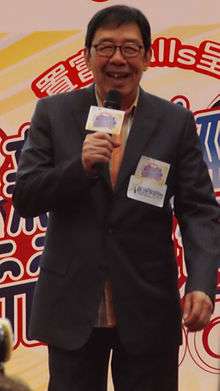Bowie Wu
| Bowie Wu | |||||||||||||
|---|---|---|---|---|---|---|---|---|---|---|---|---|---|
 | |||||||||||||
| Background information | |||||||||||||
| Chinese name |
胡楓 胡繼修 (traditional) | ||||||||||||
| Chinese name | 胡枫 (simplified) | ||||||||||||
| Pinyin | hù fēng (Mandarin) | ||||||||||||
| Jyutping | woo4 fong1 (Cantonese) | ||||||||||||
| Born |
Wu Gai Sau 18 January 1932 Guangzhou, China | ||||||||||||
| Other names |
修哥 (Sau Gor) 修修 (Sau Sau) | ||||||||||||
| Origin | Hong Kong | ||||||||||||
| Occupation | Actor | ||||||||||||
| Years active | 1953-present | ||||||||||||
| Ancestry | Guangdong, China | ||||||||||||
| |||||||||||||
Bowie Wu Fung (born 18 January 1932) is a Hong Kong actor and director with family roots in Guangdong, China. A matinee idol in the 1950s and 1960s, he began his acting career in 1953, becoming an overnight success with his debut film, Men's Hearts. In his long career he has starred opposite many of Hong Kong cinema's leading ladies, and of particular note are his many collaborations with Josephine Siao in 1960s musicals. For these roles he earned the nickname the "Dance King" for his dancing skills. In the 1970s Wu Fung began working in television and continues to do so as a contract artist to Hong Kong's TVB, with occasional guest appearances in films.
Wu Fung remains a very much loved and respected elder in Hong Kong's entertainment industry, and is "godfather" to both Jacky Cheung and Nick Cheung.
Filmography
(This list is incomplete.)
- Men's Hearts (1953)
- Tears For An Absent Love (1953)
- The Supernatural Go In-Between (1954)
- Motherly Love (1954)
- Boys Are Easy (1993)
- The Tricky Master (1999)
- Marry a Rich Man (2002)
- Love Undercover 2: Love Mission (2003)
- 72 Tenants of Prosperity - Bookstore owner (2010)
- Overheard 2 - Szema Cheung (2011)
Television series
(This list is incomplete.)
Asia Television Limited
- Rise of the Great Wall (1985)
TVB
References
- This article's content is based on that from the corresponding article on the Chinese Wikipedia.